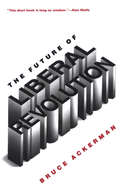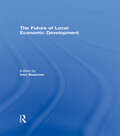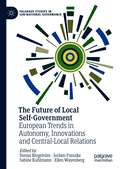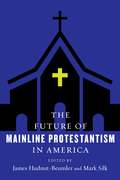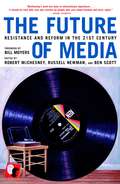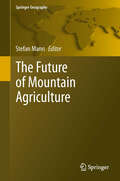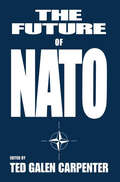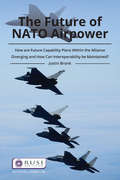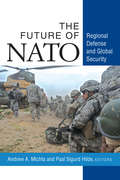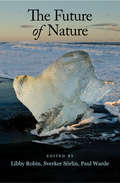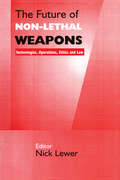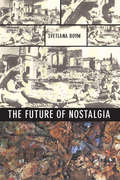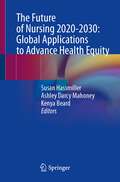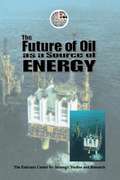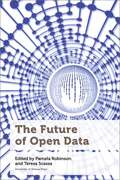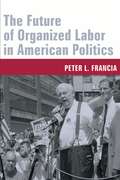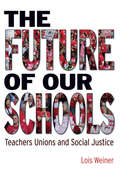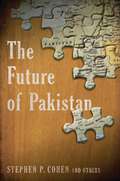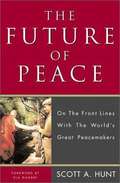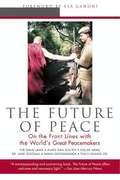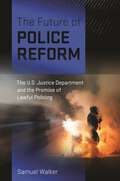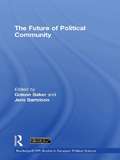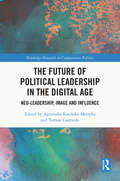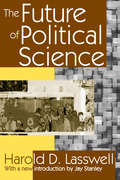- Table View
- List View
The Future of Liberal Revolution
by Bruce AckermanSince 1989, the Cold War has ended, new nations have emerged in Eastern Europe, and revolutionary struggles to establish liberal ideals have been waged against repressive governments throughout the world. Will the promise of liberalism be realized? What can liberals do to make the most of their opportunities and construct enduring forms of political order? In this important and timely book, a leading political theorist discusses the possibility of liberal democracy in Western and Eastern Europe and offers practical suggestions for its realization. Bruce Ackerman begins by sketching the challenges faced a Western Europe free for the first time in half a century to determine its own fate without the constant intervention of the United States and the Soviet Union. Unless decisive steps are taken, this moment of promise can degenerate into a new cycle of nationalist power struggle. Revolutionary action is now required to build the foundations of a democratic federal Europe-a union strong enough to keep the peace and to combat the threat of local tyrannies. Ackerman next considers Eastern Europe and discusses fundamental problems overlooked in the rush to build market economies there. He points out that leading countries-including Poland, Hungary, and Russia-have yet to establish new constitutions, contenting themselves instead with hasty amendments to old Communist documents. This is a great mistake, says Ackerman, for there is an urgent need to constitutionalize liberal revolution, and the window of opportunity for doing this is far smaller than many people realize. Neither judicial efforts to punish collaborators with the old regimes and to redress wrongs done to their victims nor the judicial activism now sweeping Eastern Europe should take priority over the formulation of democratically legitimated constitutions. Ackerman concludes by considering the impact of 1989 on South Africa, Latin America, and the United States, exploring how decisive liberal action throughout the world can help to expand the range of functioning constitutional democracies and recover liberalism's lost revolutionary heritage. .
The Future of Local Economic Development
by Ines NewmanThis book looks at the future role of local economic development. Once New Labour came to power in 1997, they sought a third way between the new right agenda of Thatcherism with its attempts to reduce the role of the local state and foster a free market and the left’s attempts to take more control over the local economy in the interest of workers. In July 2007, Gordon Brown’s government published the 'Review of Sub-national Economic Development and Regeneration'. This book argues that competitiveness and neo-liberalism, or increased market domination over an ever wider range of social relations, have in reality dominated New Labour’s policies. Yet a number of contradictions remain as New Labour continues to seek a reduction in poverty and regional and local disparities. The book analyses the changes that will result from further market domination under the Sub-national Review but also the opportunities that will arise for local economic development agents, particularly those with a concern for social justice. It looks specifically at regional and sub-regional strategy making; partnership, networking and building institutional capacity; local labour market policy and policy towards cities. An additional feature of the book is that several authors draw on international comparisons. This book was published as a special issue of Local Economy.
The Future of Local Self-Government: European Trends in Autonomy, Innovations and Central-Local Relations (Palgrave Studies in Sub-National Governance)
by Sabine Kuhlmann Tomas Bergström Jochen Franzke Ellen WayenbergThis book presents new research results on the challenges of local politics in different European countries, including Germany, the Netherlands, the Nordic countries and Switzerland, together with theoretical considerations on the further development and strengthening of local self-government. It focuses on analyses of the most recent developments in local democracy and administration.
The Future of Mainline Protestantism in America (The Future of Religion in America)
by Mark Silk Edited by James Hudnut-BeumlerAs recently as the 1960s, more than half of all American adults belonged to just a handful of mainline Protestant denominations—Presbyterian, UCC, Disciples of Christ, Episcopal, Lutheran, Methodist, and American Baptist. Presidents, congressmen, judges, business leaders, and other members of the elite overwhelmingly came from such backgrounds. But by 2010, fewer than 13 percent of adults belonged to a mainline Protestant church. What does the twenty-first century hold for this once-hegemonic religious group?In this volume, experts in American religious history and the sociology of religion examine the extraordinary decline of mainline Protestantism over the past half century and assess its future. Contributors discuss the demographics of mainline Protestants; their beliefs, practices, and modes of worship; their political views and partisan affiliations; and the social and moral questions that unite and divide Protestant communities. Other chapters examine Protestant institutions, including providers of health care and education; analyze churches’ public voice; and probe what will come from a diminished role relative to other groups in society, especially the ascendant evangelicals. Far from going extinct, the book argues, the mainline Protestant movement will continue to be a vital remnant in an American religious culture torn between the contending forces of secularism and evangelicalism.
The Future of Media: Resistance and Reform in the 21st Century
by Bill Moyers Robert Mcchesney Russell Newman Ben ScottCo-edited by acclaimed media scholar Robert W. McChesney, the book features chapters by Bill Moyers, FCC Commissioner Michael Copps, Rep. Bernie Sanders, and Newspaper Guild president Linda Foley, among many others. With the American political landscape dominated by the influence of big business, the timing of The Future of Media could hardly be more precipitous. Endlessly pressured by lobbyists payrolled by corporate broadcasters, Congress is poised to reopen the 1996 Telecommunications Act, which will reshape every facet of our media as we know it for decades to come. Winners and losers are about to be decided, while at the same time new technologies are emerging which could truly revolutionize and democratize our media system-and our culture. From cutting edge analysis to blueprints for action, The Future of Media presents a diverse collection of voices from today's growing media reform movement.
The Future of Mountain Agriculture
by Stefan MannMountain agriculture is a socially and culturally unique system, but also a regionally important economic sector. In a globalising world, it is clear that fertile areas on all continents will always be used to produce large quantities of agricultural products in order to feed the world and, increasingly, provide biomass as a source of energy. It is far less clear, however, how land use in steep and more peripheral regions will evolve. By definition, farmland in mountain areas is more difficult to work because of steep slopes and missing accessibility. Climate conditions and poor soil quality often add to these adverse conditions. Through overcoming limited views from one region only or from one discipline, this book intends to draw a first truly international perspective on the issue of mountain farming.
The Future of NATO
by Ted Galen CarpenterThe end of the Cold War has raised questions about the future of NATO. Now that the threat from the Warsaw Pact has disappeared, there seems little need for a Western military alliance of such magnitude. The contributions here offer various views on NATO's future.
The Future of NATO Airpower: How Are Future Capability Plans Within The Alliance Diverging And How Can Interoperability Be Maintained? (Whitehall Papers)
by Justin BronkAirpower remains the cornerstone of NATO’s military advantage, so maintaining the ability to win air superiority over peer opponents in a conflict is key to long-term deterrence stability in both Europe and the Pacific. This Whitehall Paper examines the various modernisation and future capability development efforts being undertaken within NATO, and analyses the major threat systems and overall modernisation trends of the West’s main peer-competitors – Russia and China. US airpower capability development efforts are increasingly focused on countering the growing challenge from the Chinese military in the Pacific. To meet this challenge, the Pentagon is planning to transform the way it operates across all domains over the next 15 years. New platforms, weapons systems and increasing automation of command and control threaten to leave NATO allies behind. Current acquisition and modernisation plans of European air forces may eventually close the capability gap with current US theatre entry standard capabilities, but by then the US will have leapt ahead once more. Furthermore, many of the airpower capabilities which the US is pursuing for the Pacific theatre are significantly less relevant for the demands of deterrence against Russia in Europe. Given continuing dependence on US enablers on the part of other NATO members, a significant divergence in capability plans threatens to undermine crucial Alliance interoperability if not recognised and managed early.
The Future of NATO: Regional Defense and Global Security
by Paal Sigurd Hilde Andrew A. MichtaThe conclusion of International Security Assistance Force (ISAF) operations in Afghanistan in 2014 closes an important chapter in the history of the North Atlantic Treaty Organization (NATO). In this volume, European and US experts examine a range of perennial issues facing the Alliance, including relations with Russia, NATO's institutional organization and command structure, and the role of the United States in the Alliance, in order to show how these issues shape today's most pressing debate--the debate over the balance between NATO's engagement in security operations globally and traditional defense within the North-Atlantic region. The volume's contributors propose that NATO can indeed find a viable balance between competing, but not inherently incompatible, strategic visions. A theoretically informed, empirical account and analysis of NATO's recent evolution, this volume will appeal to both security scholars and practitioners from the policy community.
The Future of Nature
by Paul Warde Sverker Sorlin Libby RobinThis anthology provides a comprehensive overview of the science behind environmental prediction and how, as predictions about environmental change have been taken more seriously and widely, they have affected politics, policy, and public perception. Through an array of texts and commentaries that examine the themes of progress, population, environment, biodiversity, and sustainability from a fully global perspective, it shows how twenty-first century predictors think about what forecasting the future means. Providing access and reference points to the origins and development of key disciplines and methods, it will encourage policy makers, professionals, and students to reflect on the roots of their own theories and practices.
The Future of Non-lethal Weapons: Technologies, Operations, Ethics and Law
by Nick LewerThese essays explore the increase in interest in non-lethal weapons. Such devices have meant that many armed forces and law enforcement agencies are able to act against undesirables without being accused of acting in an inhumane way. Topics for discussion in this volume include: an overview of the future of non-lethal weapons; emerging non-lethal technologies; military and police operational deployment of non-lethal weapons; a scientific evaluation of the effectiveness of non-lethal weapons; changes in international law needed to take into account non-lethal technologies; developments in genomics leading to new chemical incapacitants; implications for arms control and proliferation; the role of non-lethal weapons in human rights abuses; conceptual, theoretical and analytical perspectives on the nature of non-lethal weapons development.
The Future of Nostalgia
by Svetlana BoymCombining personal memoir, philosophical essay, and historical analysis, Svetlana Boym explores the spaces of collective nostalgia that connect national biography and personal self-fashioning in the twenty-first century. She guides us through the ruins and construction sites of post-communist cities-St. Petersburg, Moscow, Berlin, and Prague-and the imagined homelands of exiles-Benjamin, Nabokov, Mandelstahm, and Brodsky. From Jurassic Park to the Totalitarian Sculpture Garden, Boym unravels the threads of this global epidemic of longing and its antidotes.
The Future of Nursing 2020-2030: Global Applications to Advance Health Equity
by Susan Hassmiller Ashley Darcy Mahoney Kenya BeardThis book provides an application of the concepts and recommendations of The Future of Nursing 2020-2030: Charting a Path to Achieve Health Equity Report, a Consensus Study from the US National Academy of Medicine. It offers complementary guidance through tools, tips, examples and storytelling. As such this book, written by prominent international academics and nurse practitioners, offers program and policy recommendations for health equity. As the world’s largest and most trusted workforce, nurses are in a key position thus must step up to help address these inequities now. The recent pandemic has laid bare these inequities in ways that are stark and demanding of our attention. This book offers program and policy recommendations, along with case studies, designed to empower nurses to understand and ACT to improve health equity. This text provides nurses an opportunity to clearly see the need for an equitable, just, and fair society. There has never been a more urgent call to action.
The Future of Oil as a Source of Energy
by The Emirates Center for Strategic Studies and ResearchWhat is the future of oil as a primary source of energy? Is the world moving inexorably towards the end of the oil era? This book provides a comprehensive analysis of the future of oil by assessing the present realities and prospects of the oil sector, tracing the growth of alternative and renewable energy sources and examining the impact of environmental concerns. The volume also focuses on aspects of energy quality in the ongoing energy transition, highlights new technological developments in the oil industry and suggests ways to ensure price stability in the oil market.
The Future of Open Data (Law, Technology, and Media)
by Peter Johnson Tenille Brown Michael Geist Claus Rinner Tracey Lauriault Christine Varga Elizabeth Judge Fernando Perini Haewon Chung Ian Parfitt Lisa Ward Mather Renee Sieber Sarah GreeneThe Future of Open Data est issu d’un projet de recherche en partenariat subventionné pendant plusieurs années par le Conseil de recherches en sciences humaines (CRSH) qui vise à explorer les données gouvernementales géospatiales ouvertes dans une perspective interdisciplinaire. Les chercheurs associés à cette subvention ont adopté une perspective critique en sciences sociales basée sur l’impératif voulant que la recherche devrait être pertinente à la fois pour le gouvernement et pour les partenaires de la société civile œuvrant dans ce domaine.Cet ouvrage s’appuie sur les connaissances développées durant la période de validité de la subvention et soulève la question : « Quel est l’avenir des données ouvertes ? » Les collaborateurs partagent leurs idées à propos de l’avenir des données ouvertes à la suite d’observations et de recherches menées pendant cinq ans sur la communauté des données ouvertes canadiennes selon une perspective critique de ce qui pourrait et ce qui devrait arriver dans un contexte où évoluent les efforts concernant les données ouvertes.Chaque chapitre de ce livre aborde une diversité d’enjeux tout en s’appuyant sur des perspectives disciplinaires ou interdisciplinaires. Le premier chapitre retrace les origines des données ouvertes au Canada et la manière dont la situation a évolué jusqu’à aujourd’hui, en tenant compte du croisement entre le mouvement de souveraineté des données autochtones et les données ouvertes. Quelques chapitres se penchent sur certains dangers et sur les possibilités des données ouvertes, à leurs limites et même aux responsabilités qui s’y rattachent. Une autre série de chapitres examine les horizons appropriés pour les données ouvertes, incluant les données ouvertes dans le Sud global, les priorités des gouvernements locaux en matière de données et le contexte émergent des données ouvertes dans les milieux ruraux.
The Future of Organized Labor in American Politics
by Catherine FrankFrom menopause to moving in, from a first date to losing weight, this ingeniously organized book of quotations fills a gap on everyone's reference shelf. Dividing life's events into those that occur every year, occasionally, or once in a lifetime, Quotations for All Occasions provides memorable comments for each of them, allowing you to find the perfect bon mot for all of life's characteristic passages.
The Future of Organized Labor in American Politics: Investors, Ideologues, And Intimates
by Peter FranciaIn 1995, promising a more active political presence for unions, John Sweeney was elected president of the AFL-CIO. Labor would develop a "new voice," one that could not be ignored or taken for granted by Democratic and Republican politicians. However, by the summer of 2005 opposition to Sweeney's leadership threatened to divide the labor movement. In The Future of Organized Labor in American Politics, Peter L. Francia discusses the effects of Sweeney's controversial tenure as president and assesses labor's influence on American political elections and legislation. Drawing on interviews with union and business leaders, as well as campaign-finance and public-opinion data, Francia argues that Sweeney has employed a more effective and expansive grassroots political operation than his predecessors. He challenges critics who dismiss Sweeney's efforts as a failure but cautions that the decline in union membership presents a serious crisis for the labor movement.When unions emphasize "grassroots" strategies they can effectively compete against the financial power of big business and can make a significant difference in congressional politics. Francia analyzes organized labor's political activities, its coalitions with other interest groups, and its influence on voter turnout, election results, and votes in Congress. He also examines the effects of Sweeney's embrace of progressive causes and labor's increasing willingness to challenge Democrats who vote against labor's interests. For all his successes, Sweeney's tenure has not been without its problems. Labor's presence in American politics is threatened by shrinking membership in unions. Francia suggests that if unions want to remain a viable political force in congressional politics, they must devote more resources to organizing workers.
The Future of Our Schools
by Lois WeinerIn The Future of Our Schools, Lois Weiner explains why teachers who care passionately about teaching and social justice need to unite the energy for teaching to efforts to self-govern and transform teacher unions. Drawing on research and her experience as a public school teacher and union activist, she explains how to create the teachers unions public education desperately needs.Lois Weiner is a professor at New Jersey City University and has been a life-long teacher union activist who has served as an officer of three different union locals. She is the author of The Global Assault on Teaching, Teachers, and their Unions: Stories for Resistanc e .
The Future of Pakistan
by Stephen P. CohenWith each passing day, Pakistan becomes an even more crucial player in world affairs. Home of the world's second-largest Muslim population, epicenter of the global jihad, location of perhaps the planet's most dangerous borderlands, and armed with nuclear weapons, this South Asian nation will go a long way toward determining what the world looks like ten years from now. The Future of Pakistan presents and evaluates several scenarios for how the country will develop, evolve, and act in the near future, as well as the geopolitical implications of each.Led by renowned South Asia expert Stephen P. Cohen, a team of authoritative contributors looks at several pieces of the Pakistan puzzle. The book begins with Cohen's broad yet detailed overview of Pakistan, placing it within the context of current-day geopolitics and international economics. Cohen's piece is then followed by a number of shorter, more tightly focused essays addressing more specific issues of concern.Cohen's fellow contributors hail from America, Europe, India, and Pakistan itself, giving the book a uniquely international and comparative perspective. They address critical factors such as the role and impact of radical groups and militants, developments in specific key regions such as Punjab and the rugged frontier with Afghanistan, and the influence of-and interactions with-India, Pakistan's archrival since birth. The book also breaks down relations with other international powers such as China and the United States. The all-important military and internal security apparatus come under scrutiny, as do rapidly morphing social and gender issues. Political and party developments are examined along with the often amorphous division of power between Islamabad and the nation's regions and local powers.Uncertainty about Pakistan's trajectory persists. The Future of Pakistan helps us understand the current circumstances, the relevant actors and their motivation, the critical issues at hand, the different outcomes they might produce, and what it all means for Pakistanis, Indians, the United States, and the entire world.
The Future of Peace
by Scott HuntIn this illuminating journey around the globe, Scott A. Hunt takes us face to face with true heroes including: the Dalai Lama; the famed dissident of Burma, Aung San Suu Kyi; and the activist who brought peace to Latin America, Oscar Arias of Costa Rica, who share their historic struggles and show us how to find optimism in the face of anguish, and compassion in the place of animosity. What does it mean to fight for peace? From the riotous streets in Burma to a prison cell in Vietnam, from the bombed-out streets of Belfast to the refugee camps of Palestine, Scott A. Hunt travels across the globe, often under arduous conditions, to report from the major battles that shaped and continue to shape our world. Recounting histories that were not taught in school, and uncovering lessons which may have been brushed aside, Scott A. Hunt coaxes out in intimate conversations staggering stories from Vietnam's leading dissident Thich Quang Do, famed primate specialist and humanitarian Dr. Jane Goodall, Cambodia's Supreme Patriarch Maha Ghosananda, Ireland's Nobel Peace Laureate John Hume and other great leaders who have battled to end the brutality against the people and causes they cherish. In the end, The Future of Peace reveals what it means to remain steadfast to a vision of compassion, to be a leader, and to preserve peace in our own day-to-day lives. The Future of Peace is an extraordinary investigation that offers far-ranging insights and invaluable lessons - a book that changes the way we think about the world and our responsibility toward one another.
The Future of Police Reform: The U.S. Justice Department and the Promise of Lawful Policing
by Samuel WalkerThe first thorough study of the Justice Department’s pattern or practice program, examining how it works and how court-imposed consent decrees implement needed reformsAmerican society grapples with an enduring crisis in policing which is inextricably intertwined with the nation’s deeply rooted racial issues. While there have been great strides in policing over the past five decades, the United States continues to wrestle with serious crime and strained relations between law enforcement and African American communities.In this comprehensive analysis, Samuel Walker, a leading figure in the study of criminal justice, focuses on the pivotal federal effort behind police reform—the US Justice Department’s pattern or practice program. Created by Congress in 1994, this program gives the Justice Department the authority to investigate police departments that display patterns of unconstitutional practices, initiate civil suits, and secure court-enforced consent decrees that mandate reform. Walker meticulously examines the reforms dictated by these consent decrees, delves into the challenges of their implementation, and evaluates the progress made by various departments in enhancing police services. Despite various obstacles, the program has proven successful.The Future of Police Reform also considers the broader societal, political, and legal issues that profoundly influence reform efforts, such as an entrenched police subculture hindering change, the formidable power of police unions, and a lack of full support from local political leaders.In conclusion, Walker celebrates reform efforts across the country and foresees a network of local and state centers of activity fostering continued optimism for the future of police reform in the US. A collective effort holds the promise of genuine and lasting change.
The Future of Political Community (Routledge/ECPR Studies in European Political Science)
by Jens Bartelson Gideon BakerThis book explores the alternative futures of political community and moves beyond the critique of what is wrong with existing, state-based forms of political community. It does so not with the defence of a particular normative model of political community in mind, but rather in the quest for new ways of thinking about political community itself. Exploring how the political must be rethought in the twenty-first century and beyond, this book is divided into three parts: Part I focuses on the core problem that, despite the obvious need to rethink political community ‘beyond’ the nation state, our conceptual language is still thoroughly shaped by modernity, its prioritisation of the state and sovereignty, and its assumption of unifying progress in history. Part II focuses on postmodern political community, these chapters take up the calls made above for new thinking about political community that goes ‘beyond’ modern conceptions. Part III turns to the question of the emergence and decline of new forms of political community. The purpose of this section is to consider how the transformation of political community occurs in practice, and what the primary driver of this change is globally, locally and historically. This book will be of strong interest to students and scholars of International Relations, Political and Social Theory.
The Future of Political Leadership in the Digital Age: Neo-Leadership, Image and Influence (Routledge Research in Comparative Politics)
by Agnieszka Kasińska-Metryka Tomasz GajewskiThis book comprehensively describes the impact of modern technologies on political leadership by providing a new paradigm of the phenomenon of neo-leadership, that is political leadership oriented on creating both the image and political influence on the Internet. It examines its functioning in the new media environment and identifies the most important transforming trends, taking into account their impact on political and social relations in an era of dynamic technological development. Systematically exploring various dimensions of leadership, it presents new notions relevant in a networked world where leaders are created and conduct themselves against the backdrop of a technological revolution, including the development of AI, automation, algorithms and ultrafast networks, all of which strengthen or disrupt their impact and create a new set of virtual authorities exerting an increasing impact on society, ethical considerations and political life and requiring new methods for study. This book will be of key interest to scholars, students and practitioners of leadership and elite studies, media and communication studies, political marketing, political science, international relations; public policy, and sociology.
The Future of Political Science
by Harold D. LasswellHarold D. Lasswell is arguably the quintessential face of political science to the larger public of the past century. However, there is a side to Lasswell less well known, but of special importance in this day and age: the place of the profession of politics as an academic activity. This book, written at the start of the culture wars thirty years ago, outlines the basic core position of political science practitioners. It helps to explain why the field kept its collective cool, when other social science professionals veered to more extreme activist positions.The Future of Political Science grew out of the phenomenally rapid expansion of the study of government in the United States and elsewhere. The study of professionalism among physical scientists, lawyers, engineers, etc. was not matched by such internal examination within the social sciences until much later. Lasswell's overview centered on developments in the United States. There unfettered study of government reached unprecedented heights in the final stage of the twentieth century. The key concept of this volume, one that continues to inform discourse, is the relationship of political science as a mechanism for the study and teaching of the political system to the field as a tool of the Establishment. This concern grew in the wake of a variety of scandals and secret support sponsored by both government and non-government organizations alike.The Future of Political Science covers areas ranging from membership size and disparities, intervention scenarios in world events, the nature of creativity in political research collaboration in projects with the other social sciences, and the location of scientific centers of gravity in the study of politics. Because of Lasswell's works we have a field of the political science of knowledge as well as the sociology of knowledge.Harold D. Lasswell served as Ford Foundation Professor of the Social Sciences at Yale University, Distinguished Professor of Policy Sciences at Joh
